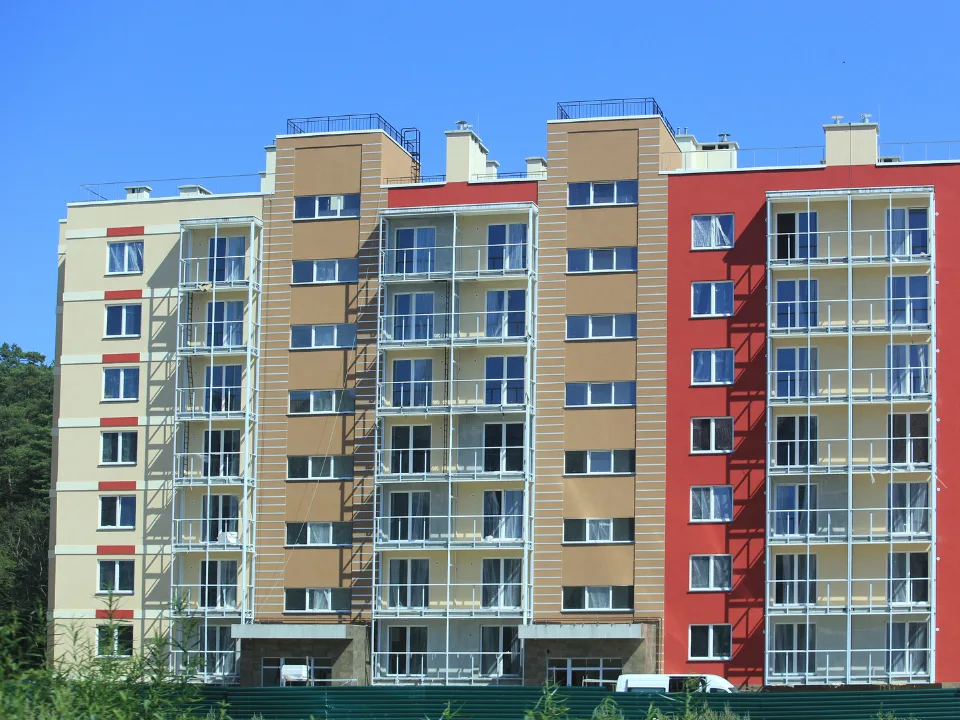Florida’s Multifamily Market Cools Down in 2023
Florida’s apartment market is entering a renter-friendly phase until early 2025 due to a peak in supply.
Together with

Good morning. Florida’s apartment market sees a drop in revenue amid rising inventory and heightened competition. Meanwhile, economic challenges and reduced demand for office space lead to fewer construction cranes in cities like Chicago and Manhattan.
Today’s issue is brought to you by RE Cost Seg. Unlock the tax benefits of your property and put more cash back in your pocket.
Market Snapshot
|
|
||||
|
|
*Data as of 2/13/2024 market close.
COOLING DOWN
Florida Apartment Markets See Declining Revenue in 2023
Florida’s apartment market is cooling off after years of high demand, with increased development in affordable beach towns leading to higher inventories and lower revenues.
Revenue dip: Florida’s apartment market, representing 17 of the nation’s top 150, is witnessing a sharp reversal. From a high of nearly 20% growth in early 2022, these markets now report a 3.4% revenue drop, diverging from the stable U.S. average and outpacing declines in states like California and Texas. This shift marks the end of a boom fueled by the remote work era, which initially drove high demand and construction in affordable coastal towns.
Factors at play: The decline in Florida’s apartment market revenues can be attributed to lower rents (-2.3%) and occupancy (-1.1%) in the past year. Additionally, the rising cost of insurance has impacted apartments significantly, with big spikes in Tampa, Miami, West Palm Beach, and Jacksonville. These markets enjoyed increased demand in 2021 and 2022 but are now facing the consequences of the surge in inventory.
Divergent performance: While smaller Florida markets, like Cape Coral, Naples, Deltona, and North Port, witnessed revenue declines ranging from 7–12% in the past year, larger markets like Miami and Tallahassee faced milder setbacks of 0.3% in revenues. These markets were better equipped to handle inventory growth and saw similar increases in inventory (around 5–6%) over the past two years.
➥ THE TAKEAWAY
It’s all about supply: Florida’s apartment market is entering a renter-friendly phase until early 2025 due to a peak in supply. Despite short-term challenges with high insurance costs, the market’s long-term fundamentals remain strong, job growth continues to outperform, and renter income is rising, indicating Florida will bounce back.
SPONSORED BY RE COST SEG
Lower your taxes and improve cash flow

Real estate is one of the most tax advantaged investment strategies out there. Professionals use cost segregation, bonus depreciation, and leverage to create massive losses.
RE Cost Seg helps real estate investors unlock these tax savings with high-quality engineering studies.
One of RE Cost Seg’s clients bought a multifamily investment in Washington for $11.6 million. They found over $2.8MM of net first year bonus depreciation – over 25% of his purchase price!
RE Cost Seg has delivered over 1600 fully engineered cost segregation studies with over $130 million in tax deductions – from single family rentals to large commercial portfolios.
Visit their website for a free proposal to see your potential tax savings.
✍️ Editor’s Picks
-
Pessimistic outlook: The Mortgage Bankers Association’s Chief Economist predicts a downturn for the U.S. economy this year amid challenges and decelerating inflation.
-
7-Day Multifamily: Whether you’re new to multifamily investing or are a current operator looking to hone your skills, the 7-Day Multifamily Program will teach you the fundamentals of successful multifamily real estate investing. (sponsored)
-
Bill battle: Two Colorado Democrats are introducing a rival bill that contradicts a controversial proposal to 4x short-term rental taxes based on days occupied.
-
Ecommerce resilience: FrontView REIT, targeting “e-commerce resistant” tenants (98.8% occupancy in Sept.), mulls over an IPO with Morgan Stanley, JPMorgan, and BofA.
-
AI reignites the Valley: Thanks to newly minted AI entrepreneurs, San Jose listings are selling at the fastest pace in the entire U.S., with first-time buyers “feeling very wealthy.”
-
Mobile potential: Investors are drawn to manufactured housing as America’s affordability crisis intensifies, with the sector seeing a surge in demand and high profitability.
-
Fighting discrimination: Settlements and legal action have reduced explicit rejections of Section 8 tenants in NYC, but implicit discrimination still persists.
🏘️ MULTIFAMILY
-
Sweater weather: Chicago’s multifamily market saw a recent string of foreclosures and a lack of bidders at auctions, but insiders claim it doesn’t indicate a plunging market.
-
Apartment oasis: Rose Equities and Garden Communities plan to replace an office building leased by LA and build a 4-building complex with 272 apartments in Torrance, CA.
-
Good deal swiped: URS Capital Partners acquired a 176-unit multifamily complex in Belmont for a little over $23M.
-
Rent matters: Despite high rents, housing-challenged Gen Z still prefers the coasts, choosing states like CA, where rent costs exceed the national median.
-
Developer default: UDR took control of a 173-unit apartment building in Downtown Oakland after developer Mill Creek Residential refused to fund further investments, resulting in a loss of $24.3M for UDR.
🏭 Industrial
-
Navigating traffic: NYC plans to expand maritime shipping to reduce street congestion caused by e-commerce deliveries, aiming to shift freight from trucks to barges.
-
Across the pond: Blackstone (BX) plans to consolidate its logistics holdings in the UK, creating Indurent with over 200 properties and 26MSF, becoming a major industrial landlord.
🏬 RETAIL
-
Retail recovery: LA’s retail market struggles to recover with 17.6MSF of vacant stores in 4Q23, while leasing is down 9% compared to 2022.
-
Immortal corner store: Investment volume in convenience stores is steady compared to other asset classes, despite a slight increase in average cap rates.
-
Taking a bite: The Urban County Planning Commission approved the development plan for a new 122KSF Kroger Marketplace (KR) on the northwest side of Lexington, a $30M investment.
-
German invasion: Aldi plans to invest £550M in expanding its UK store and distribution network this year, aiming for a long-term goal of 1.5K locations.
🏢 OFFICE
-
Trouble at the tower: An iconic Dallas office tower sells for just $8M at foreclosure and a new lawsuit alleges the former owner, Kenneth Wolfe, cheated his short-term lender when defaulting.
-
Real estate reckoning: The U.S. CRE market is experiencing stress due to empty office buildings, bad loans, and higher interest rates, causing concerns for banks and lenders.
CONSTRUCTION CRISIS
Office Towers Reshaped Skylines, But Now Cranes Are Vanishing
The ongoing decline in new office construction is creating economic challenges for U.S. cities like Chicago and Manhattan, as higher interest rates and weak demand for office space contribute to decreased construction activity.
Reporting from Chicago: Once bustling with 60 construction cranes under Mayor Rahm Emanuel in 2017, Chicago has seen a drastic 69% drop to single digits. 2023 witnessed only one groundbreaking for an office building, with none projected for 2024. This downturn mirrors the city’s economic difficulties, intensified by high-interest rates, inflation, and reduced demand for office space.
National trends: The trend of declining office building construction is not unique to Chicago but is prevalent across the U.S., from San Francisco to New York. Factors such as remote work and higher borrowing costs have devalued office properties, creating reluctance among lenders to finance new projects.
Broad impact: The reduction in office construction has wider economic implications. Downtown businesses generate less sales tax revenue due to fewer workers, and lower CRE values shift the property tax burden to homeowners. Additionally, the lack of construction hampers the vibrancy of neighborhoods and can hinder efforts to attract tenants and bring employees back to offices.
➥ THE TAKEAWAY
Looking ahead: While older office buildings struggle to attract tenants, there is some optimism for new constructions in prime locations with modern amenities. However, experts predict a delay in the return to normal construction levels, possibly until 2025, contingent on more stable interest rates and economic conditions, and increased office occupancy.
📈 CHART OF THE DAY

What did you think of today’s newsletter? |


















